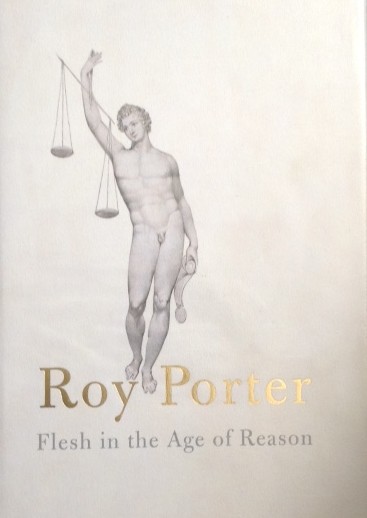Inspiring Older Readers
 posted on 20 Sep 2021
posted on 20 Sep 2021
Flesh in the Age of Reason by Roy Porter
It’s always a humbling privilege to read anything by the wonderful Roy Porter and this final book, Flesh in the Age of Reason is no exception. Porter had an astonishing brain and a genuinely awesome capacity for reading, complex interpretation and an admirable capacity for easy communication. Captivatingly for me at least, he also had a fundamentally dissenters approach to fusty establishment academia. You could argue that Porter was almost a punk academic who lived a fast, intense life and died tragically young in 2002 at the age of just 56. You’re left wondering just how he mastered so much knowledge and understanding across so many different areas – history, medicine, literature, philosophy, geology to name a mere handful.
Flesh in the Age of Reason might be seen as a fitting final landmark in his oeuvre because it pulls together so much of this huge reservoir of reading and learning. Published posthumously in 2004, it can be seen as the natural partner for his earlier 2001 masterpiece, The Enlightenment which is a riveting exploration of the key ideas that constituted the dawn of the Age of Reason.
In this book we see Porter picking up some of the juicy fruit left hanging on The Enlightenment tree and pushing deeper into some of the key philosophical debates about what we are as humans. How did philosophers begin to develop the notion of the self and how did that relate to notions of the religious ‘soul’? Perhaps more importantly, what is the relationship between the self/consciousness of the self and the mortal body? Porter presents these questions as fundamental to Enlightenment thinking but deeply contested and contentious. Is man, as Hobbes insists, nothing more than a transient lump of flesh driven by the desire to minimise suffering in a life that is (famously) nasty, brutish and short? Or is man imbued with a ‘spirit’ that is fundamentally noble and transcends (and outlasts?) the mortal body as Shaftsbury argues?
Porter steers us through these complex mazes with élan and he makes what should be mind-stretchingly complex a delight to engage with. But this isn’t just a book concerned with the bamboozling paradoxes of philosophy because Porter is also interested in the way the flesh failed those who were most fully engaged with the public debate about the dualism of body and soul. So we get, with a good dollop of humour, a portrait of Edward Gibbon whose body was nothing but a problem. Lisa Jardine in her review of the book for The Guardian captures this perfectly:
“Edward Gibbon, author of the monumental, six-volume Decline and Fall of the Roman Empire , turns out to have been a 4ft 8in fatty, known unkindly to colleagues as "Chubby-Chubb". His obesity was exacerbated by his weakness for fine wines, as a result of which he suffered from chronic gout and was permanently in pain. As if this were not enough, he had an embarrassingly visible and debilitating swelling of the scrotum, which made him smell and eventually killed him. Thus when Gibbon writes of his body as strictly "subordinate and disciplined, a means to an end", and as a "machine" to be kept under control and in strict running order, as casing for the infinitely subtle mind it encloses, he is, Porter argues, really whistling in the dark. Concentrate on the mind, he is saying, and you might be able, briefly, to forget about that mortal coil.”
I also liked Porters take on Samuel Johnson and his great shambling body full of twitches, tics and illnesses of all kinds. He gives us the unforgettable image of the great man with his mouth constantly sagging open and constantly in slobbery movement.
Importantly for me, Porter’s no slouch when it comes to literary criticism and he shows himself to be a sympathetic reader of some of the great and more difficult books – his analysis of Sterne’s Tristram Shandy, for example, is brilliant.
It’s depressing that Porter’s life and writing career came to such an early end but it’s reassuring that he left behind an unfeasibly huge back catalogue for us to work our way through.
There are paperback editions of the book available for very little money – well under £10 – but you can also get hardbacks for not a lot more and you might want one of these to keep and reread over the years.
Terry Potter
September 2021